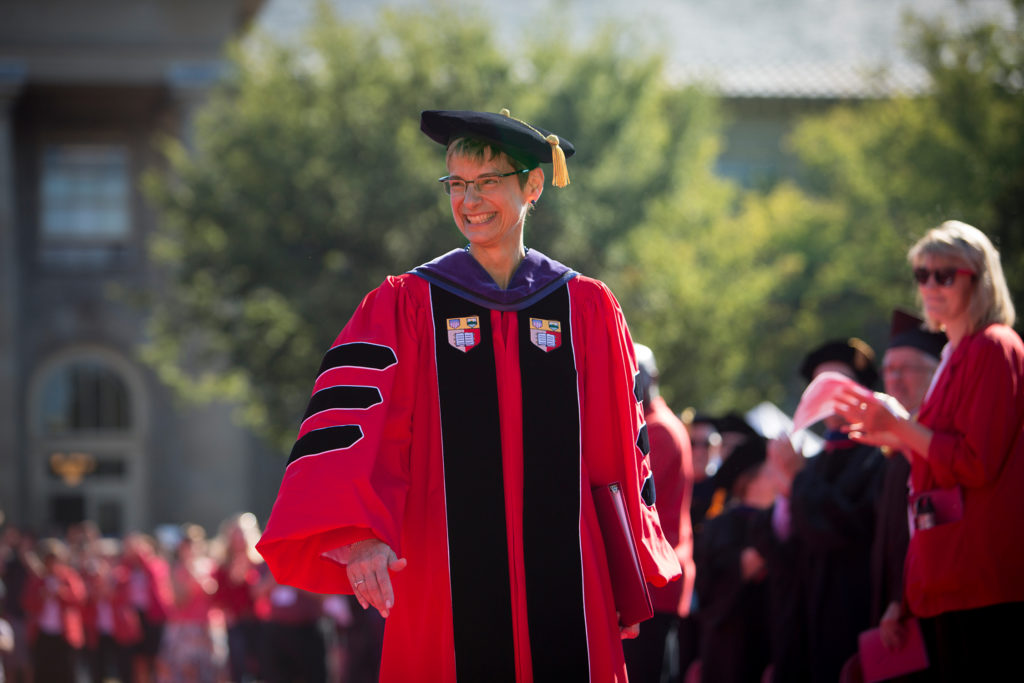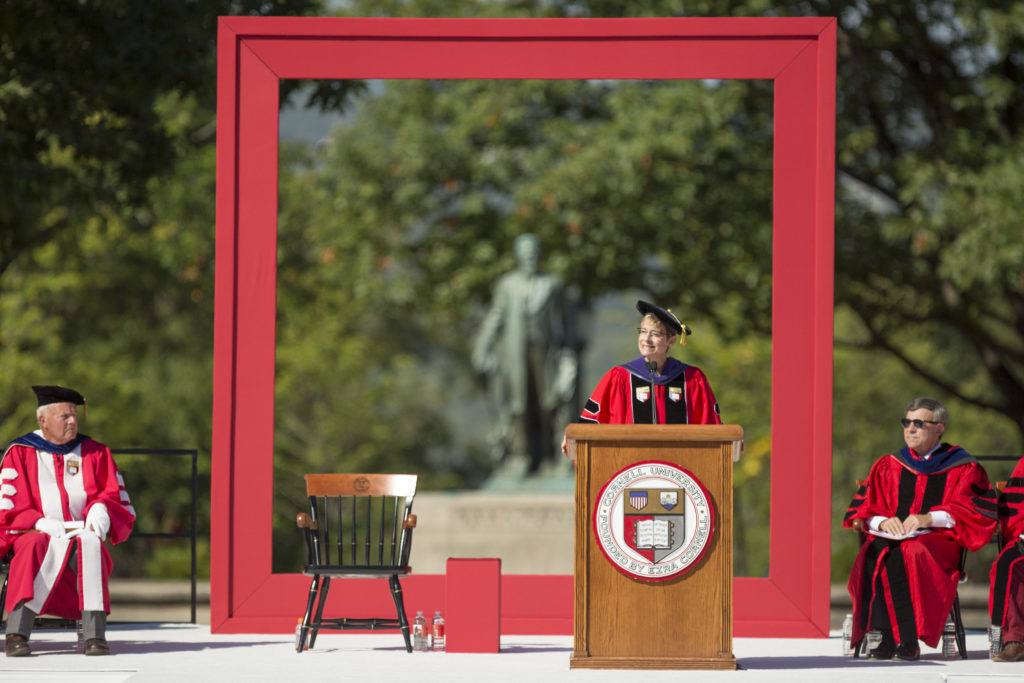On September 30, 2014, Cornell University’s Board of Trustees unanimously elected Elizabeth Garrett as the 13th president. One year later, on a crisp fall day in Ithaca, New York, she was installed as the first-ever female president of Cornell University, the 11th best university in the world according to the Center for World University Rankings, and part of the esteemed Ivy League. President Garrett joined three other women heading up Ivy League institutions at Brown University, Harvard University, and the University of Pennsylvania.
Sadly, less than a year into her role, Elizabeth joined the Omega chapter on March 6, 2016, after battling colon cancer. Her tenacity and dedication for education followed her through her final days, as she remained a steadfast advocate for all and left an undeniable legacy.

Elizabeth Garrett grew up in Oklahoma City as the daughter of two University of Oklahoma graduates. When it came time to choose a university, Sister Garrett simply said she grew up a Sooner fan, as her grandmother and parents all went there. As for sorority recruitment, that was a no-brainer, too.
Elizabeth told The Eleusis, “I always expected that I’d go through rush. My mother and grandmother were both in a sorority, though they were both Alpha Chi Omegas. I grew up knowing how important sorority life was and I never questioned that I would go through rush. My mom was clear that I should join the group where I felt like I fit, and Chi Omega seemed like the natural choice.” She pledged Chi Omega at Epsilon Alpha Chapter in 1981.
Though going to OU and joining a sorority may have been her obvious path from the start, she certainly never expected to be drawn to the field of higher education.
“I always thought I’d be a lawyer in Oklahoma or Texas,” Elizabeth said. “As my life went on, I had a variety of opportunities. I didn’t think I’d go into higher education… certainly not when I was in college or law school… but only when I was working for Senator David Boren (now president of the University of Oklahoma), I received a phone call from my law school alma mater, the University of Virginia, to be a visiting professor and that’s how I got into [higher education]. It was… serendipitous.”
While at the University of Oklahoma, Elizabeth was awarded the Ewing Fellowship to serve as an intern for Senator Boren and later graduated as a Phi Beta Kappa graduate from OU in 1985, where she earned a B.A. in history with special distinction.
After graduating from OU, she was accepted at the University of Virginia School of Law, where in 1988 she received her juris doctorate, graduating first in her class and also scoring first place on the Texas bar exam.

Though many suspected she would go immediately into private practice, Elizabeth instead served as budget and tax counsel and legislative director for Senator Boren and clerked for Justice Thurgood Marshall on the U.S. Supreme Court and Judge Stephen Williams on the federal court of appeals for the District of Columbia.
“If I were to count on the fingers of one hand the people I’ve known with the most remarkable intellect, she would be on that list,” Boren has said previously about Elizabeth.
She was then offered the opportunity to serve as a visiting professor at UVA and later at schools such as Harvard Law School, the Central European University in Budapest, and the Interdisciplinary Center Law School in Israel. She served as a professor of law at the U of Chicago, where she also served as deputy dean of academic affairs.
Elizabeth began her tenure at the U of Southern California in 2003, and in 2010 she was appointed provost and senior vice president for academic affairs—the first female provost of the university. She concurrently worked as a professor in the USC Gould School of Law and sat on the governing board of USC hospitals.
In September 2014, Cornell’s Board of Trustees elected Elizabeth as the 13th president of Cornell University. At Cornell, Elizabeth was a tenured faculty member in the Law School with joint appointments as a professor of law, government, and management at the Cornell Law School, the College of Arts and Sciences, and the Samuel Curtis Johnson Graduate School of Management.
Less than a year before her passing, The Eleusis had the opportunity to speak with our Sister to hear her thoughts on campus challenges, her perspective on Greek life, and the advice she would offer a student entering college.
What do you see as the main challenges on campus today?
Research and Funding. We want to give students the opportunity for discovery and to search for new knowledge and truth. I am excited about how we can craft students’ experiences to have this… to move out of their comfort zone and take the opportunities to stretch themselves.
A large challenge for research universities is funding for discovery-driven science. One reason our country has experienced great success is the research and discovery that are done on campuses and the culture of innovation that has been fostered. The federal decision to cut research funding puts us at a disadvantage if we want to continue to be a leader in discovery.
Cost of Education. The cost of undergrad education is certainly a challenge on college campuses. At Cornell, the debt is reasonable, and many undergraduates are able to graduate with no debt because of the generous need-based aid we are able to offer. A vast majority of our students who graduate are in a fortunate position. However, a significant amount of debt is carried by graduate students. So far, the public has not focused on this.
Students should certainly go to grad school if there is an interest. There are options that can provide training and traditional graduate education. Schools are becoming more focused on raising money for graduate scholarships. Many professional schools have programs that reduce debt load for those who go into public sector jobs.
Substance Abuse. What is troubling is the abuse of alcohol and drugs, mainly prescription drugs, by students. It is a disquieting and unacceptable trend to binge drink. There is a need for us as a community to protect each other. If we see someone who is vulnerable, it is our responsibility. Bystander education is of utmost importance so that we can protect each other.
Being in university administration, what are your thoughts on Greek Life?
While we don’t have a Chi Omega chapter here, the fact that I was part of a Greek community in college has helped and given me a sense of what that experience is like as a student. (The Theta Alpha Chapter of Chi Omega at Cornell U was first installed in 1917 and closed in 2003.)
For some students, fraternity and sorority life gives students a supportive network for their college years and after. There are other ways that students can get involved, too. [Greek life] is one way that students can become part of an organization that lasts a lifetime.
The Greek system is characterized by group behavior that can lead to good outcomes and bad outcomes. It’s important to resist and stand up when there is group behavior that is inappropriate. Because the Greek system is so organized, we can actually take a lead in education about alcohol, drugs, sexual violence, and other issues.
What is one piece of advice you would give a student entering college?
One piece of advice I would give to someone entering college is to stay open to all possibilities that are presented to you during life. If you’re too certain that one path is your destiny then you don’t notice the possibilities that are open to you.
You can’t just hope that things will happen. Make sure that you have lots of skills and capacities, be resilient and make sure you have prepared as much as you can for what will be presented to you. Things don’t “just happen” to you. You make things happen to you by being prepared and energetic.
In a 2016 New York Times article she perfectly explained the legacy she would leave on higher education saying, “Being the first woman president of Cornell, just as I was the first woman provost at U.S.C., puts me in the position of being a role model – not just for young women, but also for men. It is important for women and men to see strong and capable women in positions of leadership, so we understand that certain characteristics such as gender and race do not determine how well people do in those offices.”
